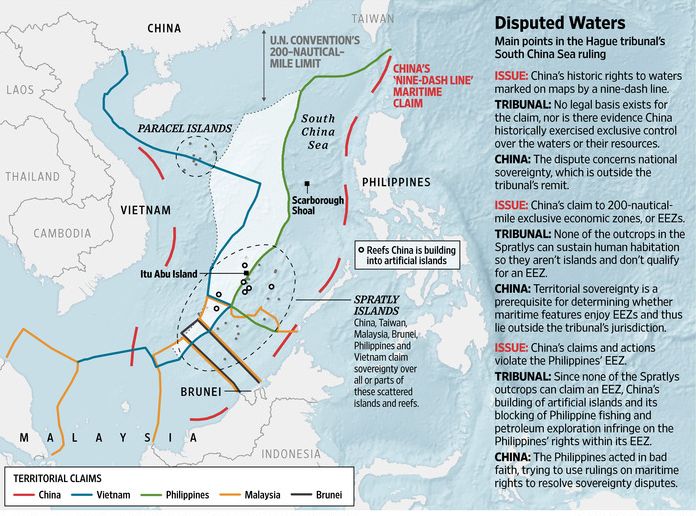By Eric Vandenbroeck
Following up on a subject I covered in earlier, an international
tribunal has now ruled that China’s claim to historic rights in most of the
South China Sea has no legal basis, dealing a severe setback to Beijing that
the U.S. fears could intensify Chinese
efforts to establish its control by force. Especially also with the
suspicion China might be preparing an air defense
zone.
A senior Chinese official reiterated today by saying that Beijing
reserves the right to declare an Air Defense Identification Zone over the South
China Sea, a move that would sharply escalate tensions in the disputed
territory. Accusing the Philippines of stirring trouble earlier today Beijing
also issued a policy paper saying the islands in the South China Sea are "China's inherent territory".

Despite Tuesday's ruling, of course, the United Nations has no mechanism
to enforce the decision, either through military action or economic sanctions.
But it could prompt China's other
Asia-Pacific rivals to also file suit, putting increased diplomatic
pressure on Beijing to reduce its presence in the South China Sea.
Signs from both Beijing and Manila thus reflect uncertainty about how
either might proceed in the wake of the ruling. Both governments, however,
appear to have reached a soft consensus to avoid unduly rocking the boat in the
short term. Rather than fan the flames of protest, the Chinese government
dispatched police officers to protect the Philippine Embassy in Beijing from
protesters. While Philippine President Rodrigo Duterte had no immediate
reaction to the ruling, Philippine Foreign Secretary Perfecto Yasay urged
"all concerned to exercise restraint and
sobriety", a message that appears, at least in part, to be tailored for
domestic consumption.
The Chinese are holding out hope that the Philippines, under the new
leadership of Duterte, can eventually being drawn out of what they see as a
U.S. coalition designed to encircle China. At the very least they want to
dissuade Duterte's government from taking actions they feel would force a
response that could turn international public opinion against them even more.
Duterte's government, meanwhile, has avoided binding commitments on the South
China Sea and has refused to accept unconditionally the U.S. position in the
waters, leaving itself space in negotiations with either the Americans or the
Chinese should it need it.
But Duterte cannot remain silent forever. Already, Philippine fishermen
are clamoring for government protection, saying the U.N. court's decision
justifies more assertive action. Chinese media reports on fishermen in Hainan
province highlighted the economic dependence of Chinese fishing villages on the
sea, suggesting that similar pressures exist in China. Though Beijing and
Manila intend to keep things calm, it is not clear that they are capable of
entirely policing their fishermen, who appear eager to assert their rights and
protect their livelihoods. The fishermen will be the greatest potential
disruptor in the South China Sea in the wake of the ruling. Unlike protesters
on the street, fishermen at sea, particularly in large numbers, are beyond the
easy control of law enforcement. The greatest struggle for both countries will
be to rein them in, preferably before they get to sea, lest they disrupt the
delicate peace. China's long-term challenge in the South China Sea, keeping the
maritime states in the Association of Southeast Asian Nations divided while
avoiding excessive costs to its reputation, is difficult enough without
unplanned crises at sea.
The Asia-Europe Meeting Summit (Asem) in Ulaanbaatar in Mongolia on
Friday and Saturday will be the first major multilateral diplomatic gathering
since today's ruling over the South China Sea.The
summit will see 53 leaders from Asia and Europe attending, including from
countries such as Vietnam and Malaysia which also claim territory in the region.It will also be the first meeting in which the new
Philippine government of President Rodrigo Duterte will be represented on the
world stage.
However, if the Philippines does not overplay its victory at The Hague,
and if other interested parties step back a little and give China space to
recognize the dangers of its own aggression, Chinese leaders may yet become
more willing to negotiate a regional agreement. The alternative, further
escalation of the Asian arms race.
Despite the diplomatic jabs the US and China have traded, China and the
United States agree that they need to manage their differences as well as they
can to avoid a complete breakdown in ties, a development that, for two nuclear
powers, would be disastrous. As tension between the two countries continues to
mount, both will search for ways to avoid crises while managing those that do
arise. Joint exercises such as RIMPAC 2016 may be just the answer they
are looking for.
China’s goal is to prevent ASEAN members from uniting against it and to
diminish the role of international law in a region where it seeks strategic
dominance.
For updates
click homepage here